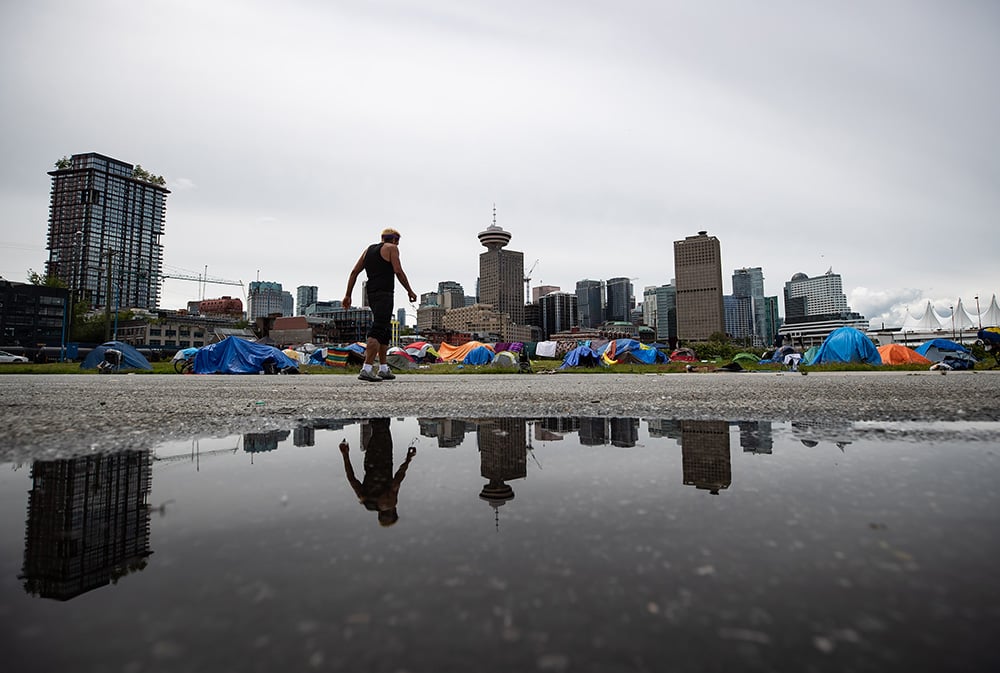A curve of grassy shoreline and beach straddling Vancouver’s poorest neighbourhood and dockyards is again the site of conflict over people’s right to live there.
Crab Park saw a string of protests by the unhoused and their advocates last summer until the courts sided with the Port Authority and police made 46 arrests while clearing the area of tent campers. Most of the displaced moved to Strathcona Park.
A year later, there are again tent campers at Crab Park, about a dozen. On Friday park rangers arrived to tell campers of an eviction order signed by Vancouver Park Board general manager Donnie Rosa telling them to permanently vacate or face arrest. Officers showed up again the next day to deliver the notice of eviction to the campers, remind them they had to leave and post fliers. No arrests were made.*
Rosa and officers showed up again the next day to deliver the notice of eviction to the campers, remind them they had to leave, and post fliers.
A Vancouver bylaw allows overnight sheltering in parks. However people encamped in public spaces must be relocated, according to a memorandum signed by the provincial government, the City of Vancouver and its park board, “when there are suitable spaces to move indoors.”
Laura Mathews, a communications staffer for BC Housing, last month told The Tyee that outreach workers were visiting Crab Park to try to connect people living there with housing.
But on Friday Crab Park residents told The Tyee they are still waiting to hear about what kind of housing might be provided to them.
Housing rights activist Fiona York says despite repeated requests that park board general manager Rosa come to Crab Park to meet with campers, it hasn’t happened.
‘If you’re in an SRO you might as well be on the street’
It’s not that park residents don’t want housing, said a camper who asked to go by the name Kelly. She assumes the evictions have been ordered because the tents are “an eyesore” for the tourists.
Kelly says the order to vacate “culled the herd” of some campers scared of losing their pets and belongings.
On the edge of the Downtown Eastside neighbourhood, Crab Park sits on unceded xʷməθkʷəy̓əm (Musqueam), Swx̱wú7mesh (Squamish) and səlil̓ilw̓ətaʔɬ (Tsleil-Waututh) territories and is controlled by the Vancouver Board of Parks and Recreation. Its parking lot is under the jurisdiction of the Port of Vancouver, a federal entity.
Kelly came to the park after spending a decade in single-room occupancy hotels and shelters around the city. Theft, infestations and disease were so common there that she had to leave to stay safe, she said. But now she’s worried she has run out of options.
“If you’re living in an SRO you might as well just be on the street anyways. There’s a lot less to deal with health-wise out here,” she says. “It’s cleaner, it’s nicer, people are more relaxed and happier except for when the rangers and the cops are here. That has been so stressful, and for a person like myself in my situation, what am I supposed to do?
“They should open up a campsite specifically for us,” a camper friend added. “If it’s just a small ten dollar fee that’s better than no housing.”
“And that would be comparable to an SRO too,” nodded Kelly.
One solution could be allowing 10 campers at each park, they said.
For Kelly, anything but another SRO will do. “I do want housing, right? It’s not that I don’t want housing, but I’m not going to go under those conditions,” she said.
“If they say I can’t deny housing and I can’t live in a park, I need a bathroom and kitchen and amenities that are mine,” said Kelly. “That way I can close the door and have security, but I don’t need a babysitter. I’m not two. I’ve walked both sides of the fence. I know how to live a working life. If I had a safe enough living space, I’d probably put myself back in that working man role again, but until I can have stability that way again, here I am.”
In May 2020, about 300 people living in tents were forcibly evicted from Oppenheimer Park and provided rooms in hotels or community centres after police dismantled the encampment. Similar sweeps occurred for encampments at Raymur Avenue in Strathcona, and then in June, at Crab Park. All the spaces were fenced off from public use.
Oppenheimer was reopened in response to public pleas during the recent heat wave. The city also shut down Strathcona Park in the spring, relocating a 24-hour overdose prevention site and hundreds of people living there.
Kelly says the park rangers gave campers a warning that the eviction notice would be delivered the day before. To her knowledge, the only reason they gave for the permanent camping ban in Crab Park was lawn maintenance.
Evictions violate UNDRIP: UBCIC chief
Tent encampments in city parks sometimes make headlines as scenes of violence but they also foster communal ties. Advocates point out that disbanding an encampment shatters bonds among members who have taken care of one another by sharing resources and safety checks. That support is especially important for Indigenous folks dealing with the impacts of colonization, homelessness and health concerns, say advocates. Homeless advocate York emailed The Tyee articles 25, 26 and 29 of the United Declaration on the Rights of Indigenous Peoples as supporting the rights of Indigenous tent dwellers to remain in place on public lands.
The Union of British Columbia Indian Chiefs has expressed support for Crab Park campers, who have a list of demands ranging from removal of the new fencing around the park to the construction of an Indigenous Long house there. They want access to running water, renovated bathrooms, an end to rangers’ regular “wellness checks” on campers and long-term supportive housing. They also want a meeting with park manager Rosa, who hasn’t responded to campers’ multiple meeting requests, York told The Tyee via email.
UBCIC Secretary-Treasurer Kukpi7 Judy Wilson says the park board and VPD should approach First Nations to consult about how to accomplish these goals.
“If the City of Vancouver and Vancouver Park Board are serious about reconciliation, they should be consulting with the titles and rights of these territories and respecting the agency of people who experience structural vulnerability under colonial Canada,” she said to The Tyee.
Wilson finds it “morally reprehensible to force people to leave against their will,” and said the evictions violate the terms of UNDRIP. The people being pushed out “are facing the intersectional crisis of poverty, COVID-19, opioid addiction, fentanyl contamination in their communities,” she said. “We can’t continue sweeping it under the rug.”
In past evacuations, law enforcement officers have seized the possessions of some tent campers. UBC law professor Alexandra Flynn, who is studying the effects on campers, said “when their things are taken, it makes them even more vulnerable than they were before. Then people have to figure out how to get new supplies with no income.”
By evicting campers from Crab Park, she says the City of Vancouver and its park board are exercising their powers as property owners or managers rather than adopting a human rights lens, as she believes they should. Because Crab Park is on federal land, the federal government is obligated under Section 35 of the Constitution to address issues relevant to Indigenous people, reminds Wilson.
“The law has not been as helpful as it should be in just answering this very basic human rights question,” says Flynn. “Legal advocates will continue to push the point in courts of law, but I think cities should understand what their obligations are and eventually I hope the courts will recognize that too.”
Wilson anticipates that as long as the city is trying to keep them out, campers are only going to keep moving from place to place, causing additional hardship to people who are already vulnerable during a pandemic.
“I’m just mystified as to why the government thinks that this is effective,” she said.
* Story corrected on July 13 at 1:16 p.m. to reflect that Vancouver Park Board general manager Donnie Rosa did not visit Crab Park on either July 9 or 10 as was wrongly reported. ![]()
Read more: Housing, Municipal Politics

















Tyee Commenting Guidelines
Comments that violate guidelines risk being deleted, and violations may result in a temporary or permanent user ban. Maintain the spirit of good conversation to stay in the discussion.
*Please note The Tyee is not a forum for spreading misinformation about COVID-19, denying its existence or minimizing its risk to public health.
Do:
Do not: